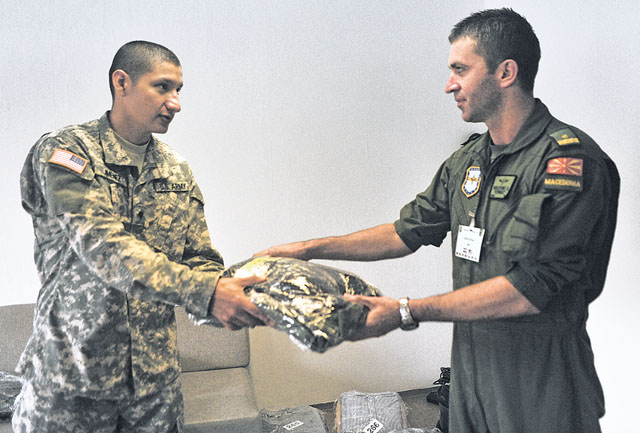
ZAGREB, Croatia — Members of the 21st Theater Sustainment Command’s 16th Sustainment Brigade partnered with Soldiers from U.S. Army Europe, the 409th Contracting Support Brigade and the Croatian army to form the Operation Immediate Response 13 Mayor’s Cell at Petar Zrinski Barracks Aug. 19 to 31.
Immediate Response 13 is a battlefield simulation exercise that brought military assets from the Balkan region of Europe together with the U.S. and members of the United Kingdom. While those involved in the exercise conduct simulated battles in the fictional country of “Atropian,” the Mayor’s Cell was responsible for ensuring all military members in attendance had a place to sleep, food to eat, gas for their vehicles and even a service to take care of laundry.
“We are taking care of all life support aspects of this exercise and making sure they run smoothly,” said Capt. Kevin F. Jagusch, the Mayor’s Cell officer in charge, normally the plans officer for the 16th SB headquarters. “By taking care of things like laundry, food and billeting, our international partners can focus on their training and mission success in this exercise.”
The Mayor’s Cell responsibilities began months before the exercise, with the coordination of contracts to purchase food, billeting, laundry services, use of the simulation center and transportation, said Sgt. 1st Class Ivan T. Luckett, the Mayor’s Cell contingency contracting NCO, a contracting NCO with the 409th CSB.
“These contracts breathe life into this exercise,” Luckett said. “Not only do they ensure that our fellow Soldiers and their partners have everything they need while they are here, they also saved approximately $13,000 in government funds.”
The Mayor’s Cell was also responsible for the movement of all computer assets and medical supplies necessary for the exercise. U.S. Army 1st Lt. Derek C. Grafton, the mayor’s cell movement control officer, 624th Movement Control Team, 39th Movement Control Battalion, coordinated the movement of computers from Grafenwöhr, Germany, and medical supplies from Pirmasens, Germany. Upon their arrival in Croatia, he ensured they cleared customs and arrived safely to the training site.
As Soldiers, civilians and members of the international military community arrived, the Mayor’s Cell received them, assigned them to rooms, issued them meal cards and issued their participant badges. During the exercise execution, they ensured the dining facility ran smoothly and that the billets were cleaned daily. They also dispensed office supplies and water.
The Croatian army members of the Mayor’s Cell assisted in all aspects of the mission. They purchased supplies for the exercise, helped pick up personnel as they arrived in Croatia, helped execute the contracts that provided life support to the operation and in-processed all members of the Croatian Army. Each U.S. member of the Mayor’s Cell had a Croatian counterpart, said Croatian Army Maj. Jurica Radic, the logistics officer for the Croatian Logistical Doctrine.
“Working together in this environment we can exchange experiences,” Radic said. “We worked with our American counterparts very well and it is important for us to come together like this to build partnership for the future.”
As the operation ended, the Mayor’s Cell collected all badges, meal cards and fuel cards, and coordinated travel for U.S. Soldiers to return home. Although they did not participate in the training exercise itself, their role made the mission a reality.
“I’m impressed with what the 21st (TSC) has been able to do,” said Lt. Gen. Donald Campbell, the U.S. Army Europe commanding general. “They bring the experience to help us with the work that we do in theater security and cooperation.”







